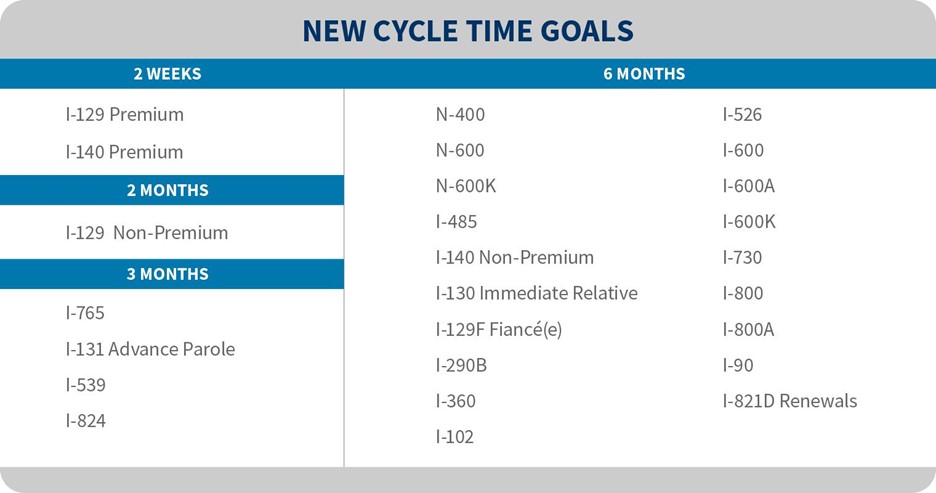The United States Immigration and Citizenship Service (USCIS) announced actions aimed at increasing efficiency and reducing burdens to the overall legal immigration system, including backlog reduction, a phased-in expansion of premium processing over a period of years, and continued efforts to improve access to employment authorization documents (EAD).
First, the USCIS announced a final rule which will gradually expand the availability of Premium Processing, which currently provides expedited processing for an additional fee for certain types of cases filed with Forms I-129 (Petition for Nonimmigrant Worker) and I-140 (Petition for Immigrant Worker). The rule will gradually expand availability of the current program in a phased-in approach over a period of years to include certain Form I-539 (Application to Change or Extend Nonimmigrant Status) categories, certain Form I-765 (Application for Employment Authorization) categories, and additional immigrant categories filed on Form I-140.
In the final rule, the USCIS indicated that in fiscal year 2022, it plans to expand premium processing to include Form I-140 EB-1 multinational managers or executives, Form I-140 EB-2 members of professions with advanced degrees or exceptional ability seeking a national interest waiver, certain Form I-539 categories and certain Form I-765 categories. The USCIS did not indicate in the final rule which Form I-539 and Form I-765 categories may become available for premium processing in fiscal year 2022. The USCIS did indicate that it expects that all categories may become available for premium processing by fiscal year 2025. The USCIS also indicated that a prerequisite for the expansion will be electronic filings of the premium processing requests which is currently not available. The announcement indicates availability of the expanding program will be announced on the USCIS website when it occurs.
When the expansion occurs, the final rule indicates that the premium processing filing fees and processing timeframes will be as follows:
- Form I-129 and current Form I-140 categories available for premium processing – Fee: $2,500. Timeframe: 15 calendar days.
- Form I-140 EB-1 multinational managers or executives and Form I-140 EB-2 national interest waiver – Fee: $2,500. Timeframe: 45 calendar days.
- Form I-539 requesting a change of status to F-1, F-2, J-1, J-2, M-1, or M-2 nonimmigrant status or a change of status to or extension of stay in E-1, E-2, E-3, H-4, L-2, O-3, P-4, or R-2 nonimmigrant status. Fee: $1,750. Timeframe: 30 calendar days.
- Form I-765 - Fee: $1,500. Timeframe: 30 calendar days.
Second, the announcement includes new “cycle time” goals, which are internal metrics that guide the backlog reduction efforts of the USCIS workforce and affect how long it takes the agency to process cases. As cycle times improve, the USCIS indicated that it expects that processing times will follow, and applicants and petitioners will receive decisions on their cases more quickly. The following are the goals that the USCIS provided in the announcement:

In the final rule, the USCIS acknowledged that it is not currently meeting these goals. The USCIS indicated that it plans on meeting these goals by September 2023. The USCIS also indicated that the future expansion of premium processing will not adversely impact the regular processing of petitions that are not filed using the premium processing service.
Finally, the announcement indicates that the USCIS continues to make progress toward a temporary final rule, “Temporary Increase of the Automatic Extension Period of Employment Authorization and Documentation for Certain Renewal Applicants,” aimed at building on previous efforts to streamline EAD processes and ensure certain individuals will not lose their work authorization status while their applications are pending. Previous efforts included extending validity periods for certain EADs and providing expedited renewals for healthcare and childcare workers.
Information about the future expansion of premium processing will be posted on our firm’s website when it becomes available. If you have questions about this USCIS announcement, please contact one of our attorneys.
©2026 Masuda, Funai, Eifert & Mitchell, Ltd. All rights reserved. This publication should not be construed as legal advice or legal opinion on any specific facts or circumstances. The contents are intended solely for informational purposes and you should not act or rely upon information contained herein without consulting a lawyer for advice. This publication may constitute Advertising Material.